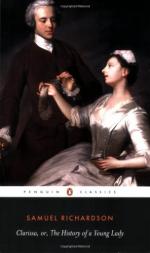Here were two happy days to both. Why cannot I make every day equally happy? It looks as if it were in my power to do so. Strange, I should thus delight in teasing a woman I so dearly love! I must, I doubt, have something in my temper like Miss Howe, who loves to plague the man who puts himself in her power.—But I could not do thus by such an angel as this, did I not believe that, after her probation time shall be expired, and if she be not to be brought to cohabitation, (my darling view,) I shall reward her as she wishes.
Saturday is half over. We are equally happy—preparing for the play. Polly has offered her company, and is accepted. I have directed her where to weep: and this not only to show her humanity, [a weeping eye indicates a gentle heart,] but to have a pretence to hide her face with a fan or handkerchief.—Yet Polly is far from being every man’s girl; and we shall sit in the gallery green-box.
The woes of others, so well represented as those of Belvidera particularly will be, must, I hope, unlock and open my charmer’s heart. Whenever I have been able to prevail upon a girl to permit me to attend her to a play, I have thought myself sure of her. The female heart (all gentleness and harmony by nature) expands, and forgets its forms, when its attention is carried out of itself at an agreeable or affecting entertainment—music, and perhaps a collation afterwards, co-operating.
Indeed, I have no hope of such an effect here; but I have more than one end to answer by getting her to a play. To name but one.—Dorcas has a master-key, as I have told thee.—But it were worth while to carry her to the play of Venice Preserved, were it but to show her, that there have been, and may be, much deeper distresses than she can possibly know.
Thus exceedingly happy are we at present. I hope we shall not find any of Nat. Lee’s left-handed gods at work, to dash our bowl of joy with wormwood.
R. Lovelace.
LETTER XLI
Miss Clarissa Harlowe, to miss
Howe
Friday, may 19.
I would not, if I could help it, be so continually brooding over the dark and gloomy face of my condition [all nature, you know, my dear, and every thing in it, has a bright and a gloomy side] as to be thought unable to enjoy a more hopeful prospect. And this, not only for my own sake, but for yours, who take such generous concern in all that befalls me.
Let me tell you then, my dear, that I have known four-and-twenty hours together not unhappy ones, my situation considered.
[She then gives the particulars of the conversation
which she had
overheard between Mr. Lovelace,
Mrs. Sinclair, and Miss Martin; but
accounts more minutely than he had
done for the opportunity she had of
overhearing it, unknown to them.




